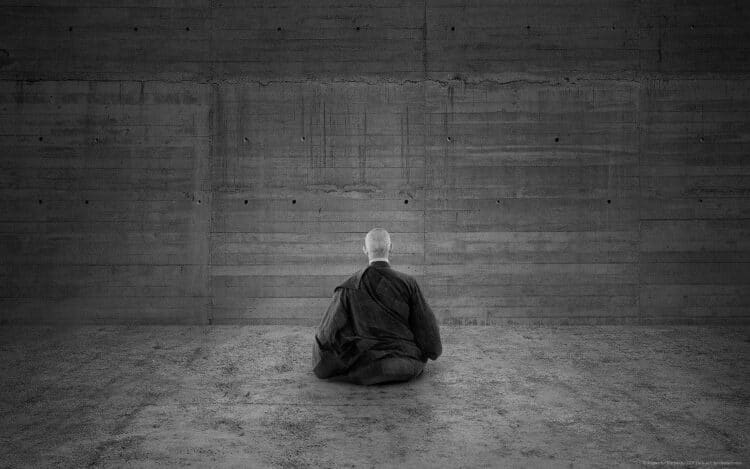The meaning of the word Zen is the Japanese equivalent of the Chinese word “Ch’an” and it means a kind of meditation. We often hear the word Zen side by side with the word philosophy. Zen philosophy is used to describe the meditative state. Its basic teaching is to lead a happy and positive life.
Aren’t we trapped in the lives we are in a constant rush? Students trying to catch up with homework for exams at school, employees running from one meeting to another, people trying to bear every burden of the house alone… We are all just passing the day without realizing the life we live in different rush. How would you like to turn inward and find the meaning of life amidst this intense rush? Let’s look at the basics of this deep-rooted teaching that you can breathe and start finding happiness by getting away from the intensity you are in.
What is Zen Philosophy?
Zen philosophy was rooted in China and then spread to Korea and Japan. It has its origins in Indian Mahayana Buddhism and Taoism. This philosophy has existed in Asia for many years. It has been popular in western civilizations since the 19th century. Zen philosophy is also called Zen Buddhism in some sources. The basis of philosophy is to seek the meaning of life. What really is the meaning of life?
Zen philosophy advises that enlightenment happens when we look within to find the meaning of life. It is not the right approach to look for answers to questions around or in someone else. Where do we find the questions? Inside us. Then the answers to those questions are within us. No need to look far.
However, finding the answers is not that easy, even if it is within us. Just thinking wisely and studying the scriptures is never enough to learn the facts of life. The person who wants to find the truth must first open his mind and body, and for this he must meditate. Through meditation and other techniques, you can control your mind and find answers.
What are the Principles of Zen Philosophy?
The main principles of Zen philosophy are:
- Simplify by getting rid of the excesses in life. Redundancy is always an obstacle to progress.
- To live life through your own eyes and not through the eyes of others, and to be natural.
- Being able to stay calm in any situation by making calmness a philosophy of life.
- Living things slowly, without rushing. Living all the details of the moment by staying in the moment.
- Identifying your priorities in life.
Apart from these principles, if we need to summarize the philosophy of zen briefly, we can explain it as follows: The purpose of philosophy is to get rid of the things that affect you negatively and make you unhappy in your life. You have to digest the moment and live happily. Living fast prevents you from being aware of those around you. However, what is this speed when you can live by seeing?
Living the Zen Philosophy
1) First, regulate your breathing and posture, then your mind.
No matter what, upright posture is important in every aspect of life. Upright posture is very important in the placement of our organs. The more wide and healthy space we open for them, the better they will work. In addition, upright posture is the key to healthy breathing. Healthy breathing will help your mind work.
As we have said before, body and mind are inseparable pairs in zen philosophy. The cleaner we use our body, the clearer our minds become. Physiologically relaxing our body will allow you to think more comfortably and healthily.
2) Try to be light like water.
The lives we live today are filled with dozens of shares and many connections. In this case, our minds are kind of always busy. The famous Chinese philosopher Zhuang Zi advises in his teachings: Live lightly like water. So, how can it be possible to live like water in such a busy life?
What you need to do to realize meaningful relationships is to draw a boundary between you and the people who come into your life. Acting in line with the needs of the people around you is a big obstacle to your self-realization. Drawing a border between you will prevent you from being shaped according to those needs and will allow you to realize yourself.
3) Live what you say.
One of the most important principles of Zen philosophy is that you should live a life that aligns with what your language says. The actions you take in life should match your language. Only then can you begin to build more meaningful relationships.
4) Let the people around you impress you with what they do.
The people you interact with are very influential on the way you live. Whatever they do, after a while, you start to do it without realizing it. Therefore, surround yourself with people you truly admire so that the behaviors and philosophy you will get from them will be good.
Zen Philosophy and Teachings
1) Shoshin
According to this teaching, which means “beginner’s mind,” you should always be eager to learn something new. Remember that no matter how much you trust your knowledge of a subject, you can always learn something new. You must not let your knowledge lead you to be arrogant. You may think you are a master at something. However, you must remember that you are always a beginner. Your perceptions will be clearer as long as you are eager to learn new things. In this way, it is much easier to notice your surroundings.
2) Walking Meditation
You wake up in the morning and you are walking to the bus stop to go to work. You leave your office during lunch break and are walking towards a restaurant. You walk home to avoid being stuck in traffic after work. Even in your daily life, we can list dozens of walking moments. Did you know that walking, which is one of our most common actions, is actually a meditation?
Staying in the moment is one of the principles of zen philosophy. Can we be aware of the surroundings while our walks take place unconsciously during the day? Of course not. However, there is a life flowing around us as we walk. Try to feel the calmness in the steps you take. Try to be aware of your surroundings by staying in the moment. Believe me, it will be very good for you.
3) Satori
The meaning of satori, another teaching of Zen philosophy, is awakening and enlightenment. According to philosophy, individuals who have attained satori can now cope with all kinds of difficulties in their lives. Now he is more sensitive to his surroundings and is aware of what is going on. The individual who reaches Santorini now begins to live his own reality.
4) Zazen
Is it possible to calm our body and mind just by sitting? Yes it is possible. You can do this just by sitting down. Zazen simply means sitting. When a person begins to fully know his own mind, nothing will be the same as before. In order for him to know himself, he has to calm his own mind just by sitting down.
Try to calm your body and mind by staying away from all kinds of factors that may disturb you in a calm environment. Bring your body to an upright position and focus on sitting while breathing. This way you can calm your mind.
5) Koan
The dictionary meaning of the word koan is “public trial” or “public event”. If we mean in Zen philosophy, they are questions that can only be perceived by intuition and cannot be answered. Koan are conversations between old masters or masters and apprentices. But the essence of all koans is through contradiction. Some of the true and false are in a single statement.
Related content that might interest you:
3 Adımda İş ve Eğitim Hayatında Kaizen Felsefesi Nasıl Kullanılır?

























